Scenario Analysis is a tool to assist in making decisions under uncertainty. It provides a structured...
In today's fast-paced business landscape, traditional planning approaches that depend on a single, static view of the future are no longer sufficient. FP&A Scenario Management has become an essential solution, empowering organisations to anticipate and navigate various potential outcomes, ultimately helping them achieve both short- and long-term goals.
At the FP&A Trends webinar on September 25th, 2024, we explored the transformative potential of FP&A Scenario Management in depth.
Why Scenario Management?
Massimo Garau, CFO at Veganz Group AG, introduced the concept of Scenario Management as a critical tool for effective decision-making in today’s rapidly changing business environment. His presentation emphasised the importance of integrating Scenario Management into planning processes to better navigate uncertainties and opportunities.
He highlighted the increasing need for Scenario Management due to social and economic uncertainties, regulations, and stakeholder demands. These changes make outcomes even more unpredictable, leaving decision-makers less time to respond. Scenario Management allows companies to proactively address risks and opportunities, enabling them to navigate uncertainty more effectively.
A Holistic Approach to Scenario Management
Scenario Management was not confined solely to the finance department but applied across the entire organisation, impacting operational and strategic areas. Massimo stressed that it impacted everything from emerging technologies like Artificial Intelligence (AI) to significant disruptions like Brexit. This approach ensured that all functions within a company were prepared to adapt to both short-term shifts and long-term transformations.
Strategic Planning and Scenario Management
Massimo outlined how Scenario Management helped businesses anticipate events like product launches and customer demand shifts. He advised focusing on key business drivers specific to each company instead of relying solely on industry-wide assumptions. Companies could better gauge their vulnerability and potential risks by understanding the concentration of revenues and profits from specific products or customers.
Steps for Implementing Scenario Management
Massimo provided a clear, actionable framework for implementing Scenario Management:
- Identify Key Drivers: Focus on 3–4 critical drivers specific to your business.
- Envision Possible Scenarios: Consider radical changes rather than incremental shifts.
- Quantify the Impact: Estimate the financial effects of each scenario.
- Translate into Financials: Understand how each scenario would affect financial statements.
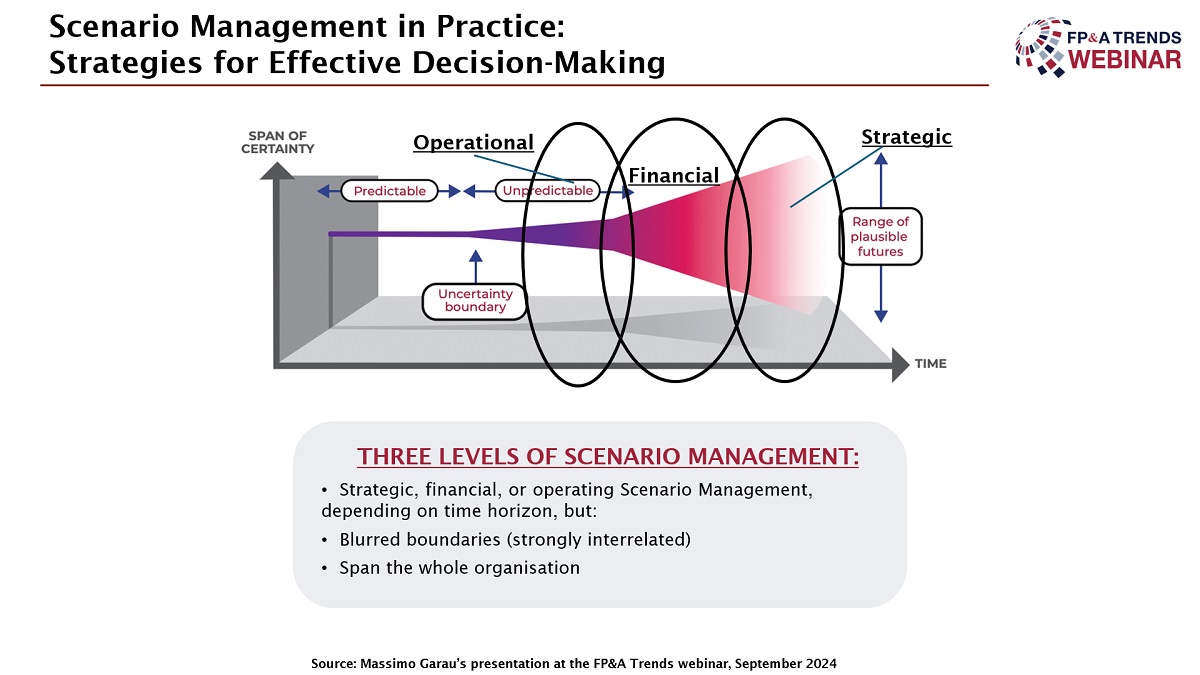
Figure 1
Conclusion
Massimo concluded by emphasising that Scenario Management was not about predicting the future but preparing for it. This approach enabled organisations to remain agile, responsive, and well-equipped to manage unknown futures. His insights offered valuable guidance on how companies could integrate Scenario Management into their strategic decision-making to thrive in a volatile business world.
Do FP&A teams leverage Scenario Management?
Our first polling question on the use of Scenario Planning showed that nearly 90% of participants rely on Excel for Scenario Planning, and most use either simple Excel-based models or automated driver-based models. Only 5% reported using advanced, multidimensional Scenario Management. Encouragingly, only 7% indicated they do not use Scenario Planning at all. The results highlight our heavy dependence on Excel with a tendency toward encouraging the adoption of more advanced, multidimensional Scenario Management tools in the future.
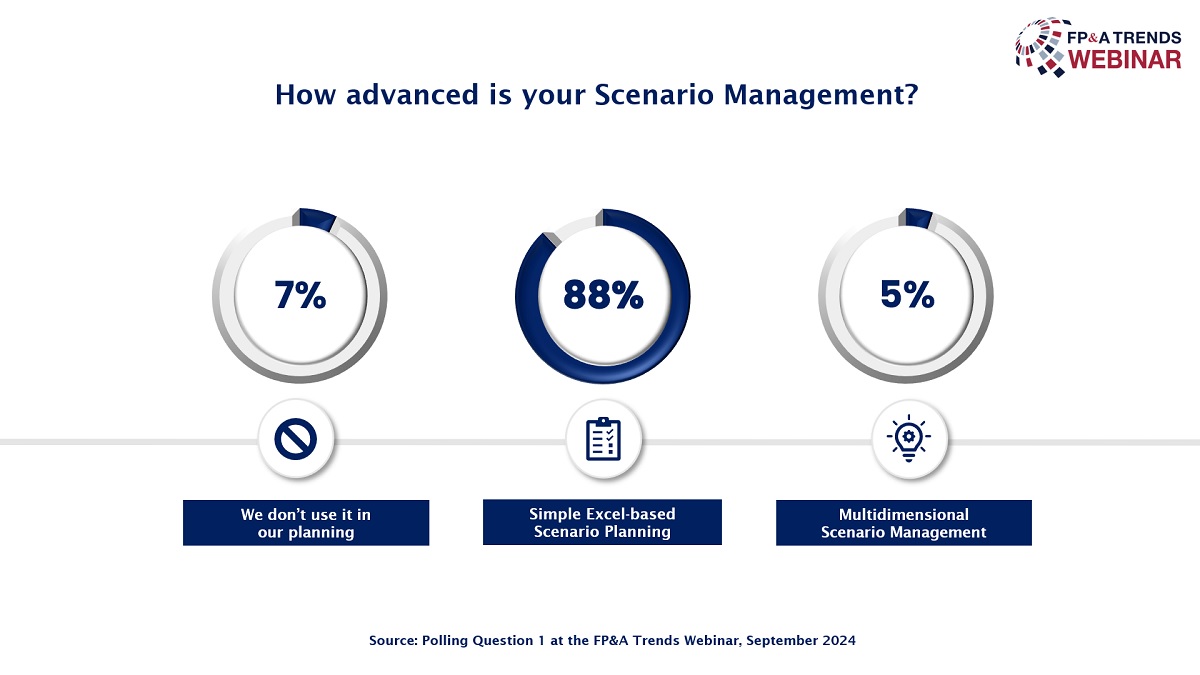
Figure 2
The Importance of Scenario Planning in Times of Uncertainty
Milind Karnik, Head of FP&A at Citizens, discussed the vital role of Scenario Planning in managing unpredictable and high-impact events, often called "Black Swan". Drawing from experiences with events like the COVID-19 pandemic, the 2008-2009 Great Recession, product successes and failures, and interest rate hikes, Milind demonstrated how companies can navigate uncertain times by preparing for various possible outcomes.
He underscored the importance of learning from Black Swan events. For instance, during COVID-19, organisations faced multiple challenges, which made Scenario Planning particularly complex. Karnik shared how critical it was to account for various economic factors and connections that might not have been initially considered. Similarly, during the Great Recession, businesses needed to adjust for unemployment spikes and market declines. This demonstrates how a single economic shift can lead to a cascade of effects across credit losses, market values, and interest rates.
Additionally, Milind stressed the need for Scenario Planning not only for potential failures but also for unexpected successes. Organisations often prepare contingency plans for downturns but rarely focus on how to manage overwhelming success. Planning for both is essential for sustainable growth.
He also addressed the importance of anticipating expected and unexpected outcomes, such as those triggered by the recent Federal Reserve interest rate hikes. These events often create unexpected correlations that can affect business activity and operational decisions.
In terms of practical implementation, Karnik highlighted the importance of senior management buy-in and clearly communicating the purpose of Scenario Planning. He also recommended determining whether Scenario Planning should be integrated into regular forecasts or handled as a special project. Managing data systematically and providing clear, specific guidance, such as understanding correlations between unemployment and credit losses, are key for effective Scenario Planning.
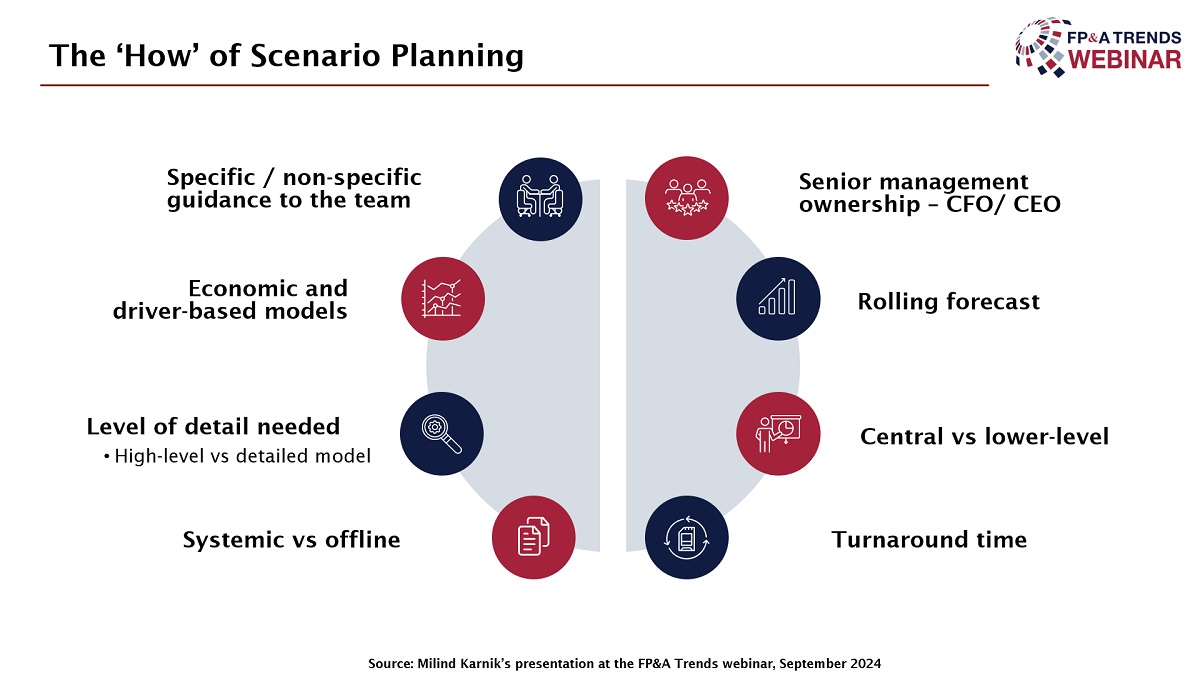
Figure 3
In conclusion, Milind underscored that Scenario Planning is crucial for organisations to remain agile and responsive during uncertain times. By developing comprehensive playbooks, securing leadership support, and using data-driven approaches, businesses can navigate unpredictable events with greater confidence and resilience.
The second poll helped us learn how long Scenario Planning typically takes. The poll results revealed that:
- 6% can run scenarios in real time,
- 12% can run them in less than a day,
- 44% said it takes about a week,
- 25% found it very time-consuming,
- 13% are unable to run scenarios at all.
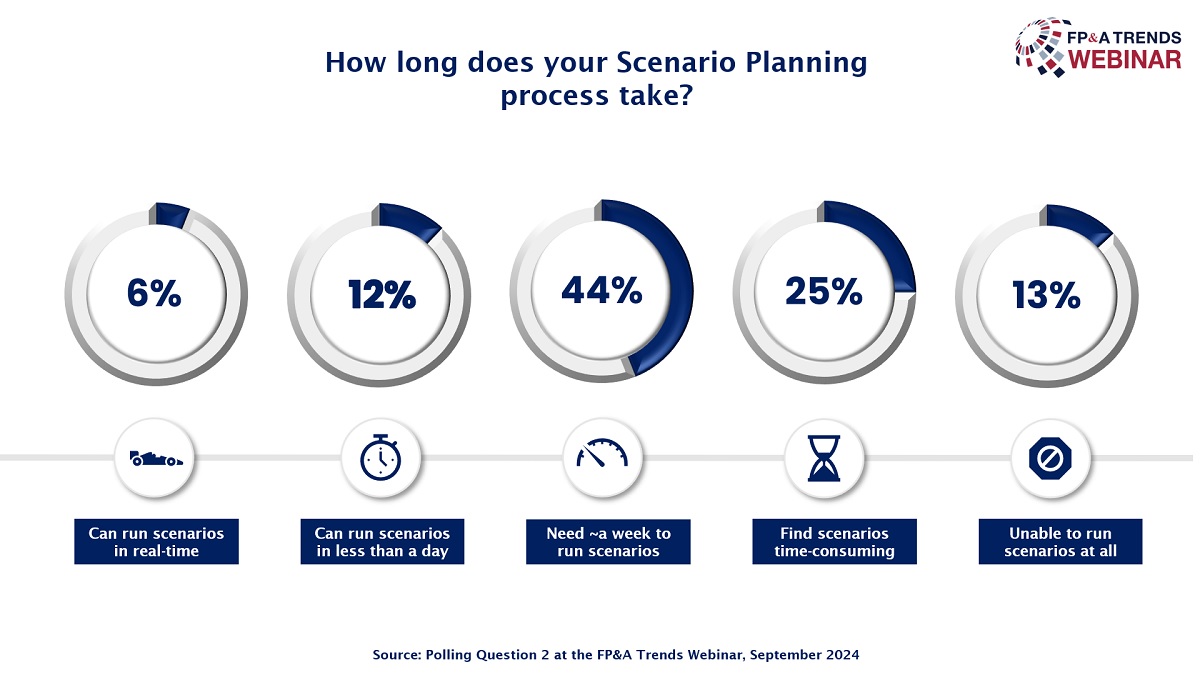
Figure 4
The Role of Technology in Enhancing Scenario Planning
Ben Page, VP of Solution Consulting at Planful, highlighted the significant role of technology in improving Scenario Planning capabilities. While a well-structured process is critical, having the right tools to support it is equally important. Many companies still rely on Excel for Scenario Planning, but its limitations, such as errors and security issues, can hinder efficiency.
Ben recommended increasing the frequency of Scenario Planning cycles, moving from annual and semi-annual forecasts to quarterly or even monthly Rolling Forecasts. This enables businesses to better anticipate and react to unexpected events like economic recessions or market changes.
Technology can benefit areas such as workforce management, supply chains, and product launches. Automation can streamline these processes, reducing the number of manual tasks and allowing companies to focus on strategic decisions. Additionally, technology platforms offer a secure environment, ensuring that sensitive data is protected and available only to authorised personnel.
Another advantage of adopting technology is its scalability. Businesses, especially those in industries like consumer goods, need tools that can manage detailed planning at various levels of granularity, such as Stock Keeping Units (SKU)-level forecasting.
Collaboration and communication are essential in Scenario Planning, and technology facilitates better teamwork. As Ben put it, planning and forecasting are "team sports," so involving more stakeholders leads to stronger decision-making.
In conclusion, technology enhances Scenario Planning by increasing accuracy, efficiency, and scalability. Moving away from Excel and adopting advanced tools helps businesses respond more effectively to change, manage risks, and improve forecast accuracy, making them more resilient in a dynamic business environment.
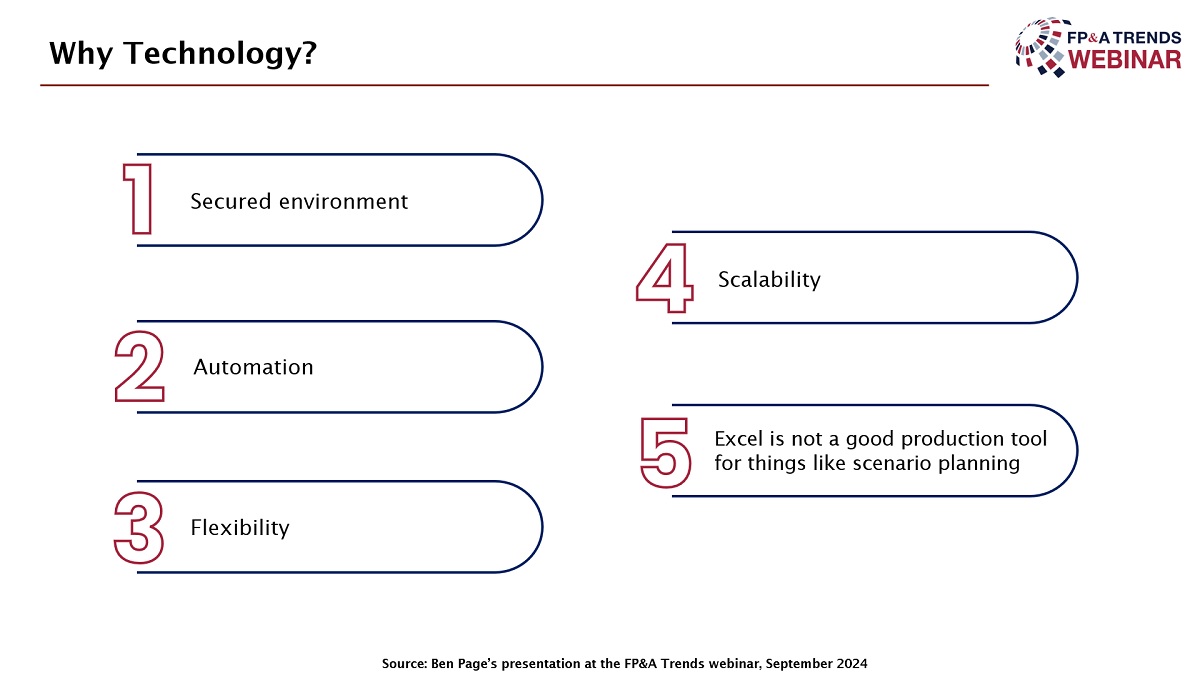
Figure 5
Conclusion
The panellists concluded with essential points for effective Scenario Management. Massimo advised to "think big, but act in small steps," highlighting the need for a balanced approach. Milind underscored the need for engagement and open communication within the organisation to ensure stakeholder buy-in. Ben reinforced that Scenario Planning is a collaborative effort and emphasised the importance of valuing progress over perfection, noting that the journey of planning matters more than achieving an ideal outcome.
We are grateful to Planful for sponsoring this webinar and to our esteemed panellists, Massimo Garau, Milind Karnik, and Ben Page, for their invaluable contributions to making it insightful and successful.
Subscribe to
FP&A Trends Digest

We will regularly update you on the latest trends and developments in FP&A. Take the opportunity to have articles written by finance thought leaders delivered directly to your inbox; watch compelling webinars; connect with like-minded professionals; and become a part of our global community.







